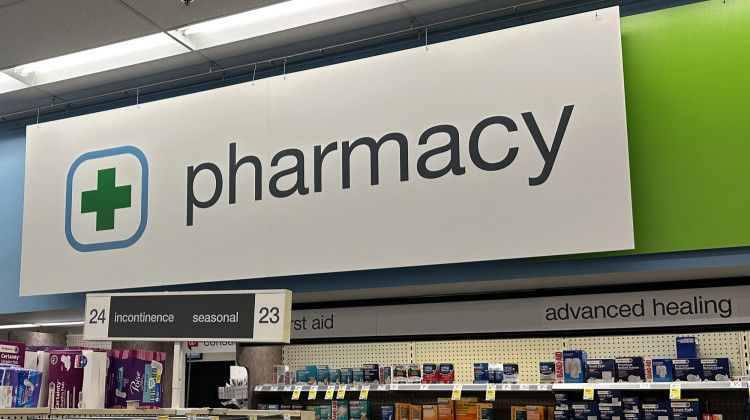
Several people get the COVID-19 vaccine at a mass clinic at the Corinthian Baptist Church in Des Moines. The church was intentionally selected for the clinic as a safe space for many members of the Black community to get vaccinated.
Natalie Krebs/Side Effects Public MediaOn a recent Saturday, a mass COVID-19 vaccination clinic is in full swing at the Corinthian Baptist Church in Des Moines.
People sit patiently, scattered throughout the church’s pews for the required 15 minute waiting period after their shot.
In the dimly lit room, they face a stained glass mural. It serves as a reminder of the church’s significance in the Black community. It depicts scenes like slaves arriving from Africa, Black church choirs and civil rights leaders.
Jacquie Easley McGhee, the health chair for the NAACP in Iowa and Nebraska, pointed out a part of the mural that's special to her.
"The little girl with the beads in her hair — that is my daughter, when she was two years old. [She] is now immortalized in our church," she said.

This is Easley McGhee's church and she says her husband designed that mural to be welcoming.
Easley McGhee said hosting clinics in safe spaces like this are crucial to getting the Black community vaccinated against COVID-19.
She said internal polling by the NAACP last fall showed the majority of Blacks said they were not likely to get the vaccine.
To increase confidence, Easley McGhee’s pumped information into the community, putting together panels with Black doctors, faith leaders and even vaccine trial participants.
"In a pandemic we really needed, you know, that message to come from people that look like them," she said.
The state’s Black community isn’t the only group that’s been hesitant about getting the COVID-19 vaccine.
Rolando Sanchez, a pulmonologist at the University of Iowa, works with a group of doctors to reach out to the state’s Latinx community.
He said he’s done everything from debunk vaccine conspiracy theories to address fears of deportation from going to health clinics.
"There is a lot of misinformation," he said, "and some of them also don't speak English so they don't have access to education and information in their own language."
According to a poll released by NPR and the PBS NewsHour last month, 30 percent of Americans say they do not plan to get the vaccine.
Aaron Scherer, a professor of Internal Medicine at the University of Iowa, studies vaccine confidence. He said there’s been a lot of poor communication during this rollout.
"A lot of times you have to think about what the underlying motivations are, you know, whether they're conscious or not, that might be driving that resistance to getting vaccinated," he said.
Take the concerns that available vaccines were developed too quickly. Scherer says he frequently hears leaders point out that the vaccines have passed FDA safety checks.
"This explanation really doesn't address that intuition, that there's a trade off between speed and quality," he said.
Scherer said with that in mind, this concern would be better addressed by explaining this coronavirus is very similar to the virus that caused the 2003 SARS outbreak, so scientists already had a lot of the data they needed to develop the vaccine.
"It's kind of like starting the 100 meter dash at the 90 meter line, you know, you don't have this far to go," he said.
Scherer said in order to reach hesitant groups, this reassuring, empathetic messaging needs to be pushed by trusted leaders in those groups.
But that’s not always so easy.

While recent polls have found vaccine confidence is increasing overall, including in minority communities. Forty-nine percent of Republican men said they are not planning to get the shot, according to last month’s national poll by NPR and the PBS NewsHour.
Top Republican leaders like Gov. Kim Reynolds and Senators Joni Ernst and Chuck Grassley have encouraged everyone to get vaccinated.
But Iowa Speaker of the House Pat Grassley - the grandson of Sen. Chuck Grassley - has so far declined. He said on Iowa Press last week he doesn’t think his decision will influence the public.
"My personal choice as far as what I do has nothing to do with a political stance or anything like that and so I think that anyone that is eligible when the eligibility comes should be in line to do so. I have just chosen not to do so," he said.
Iowa City resident Nick Dallege said he feels his Republican family members who don’t want the vaccine are mostly influenced by conservative media personalities, who continue to plant seeds of doubt about the vaccine.
"And when you do that, people who are more susceptible to conspiracy theories or believing, you know, things that aren’t outright proven. They're going to take that little twinge of doubt and run with it," he said.
Dallege said he hopes his relatives will change their minds.
9(MDIwNjQ2MTYzMDE0NDM1NTQ0OThlYjEzMg001))
 DONATE
DONATE






 Support WFYI. We can't do it without you.
Support WFYI. We can't do it without you.